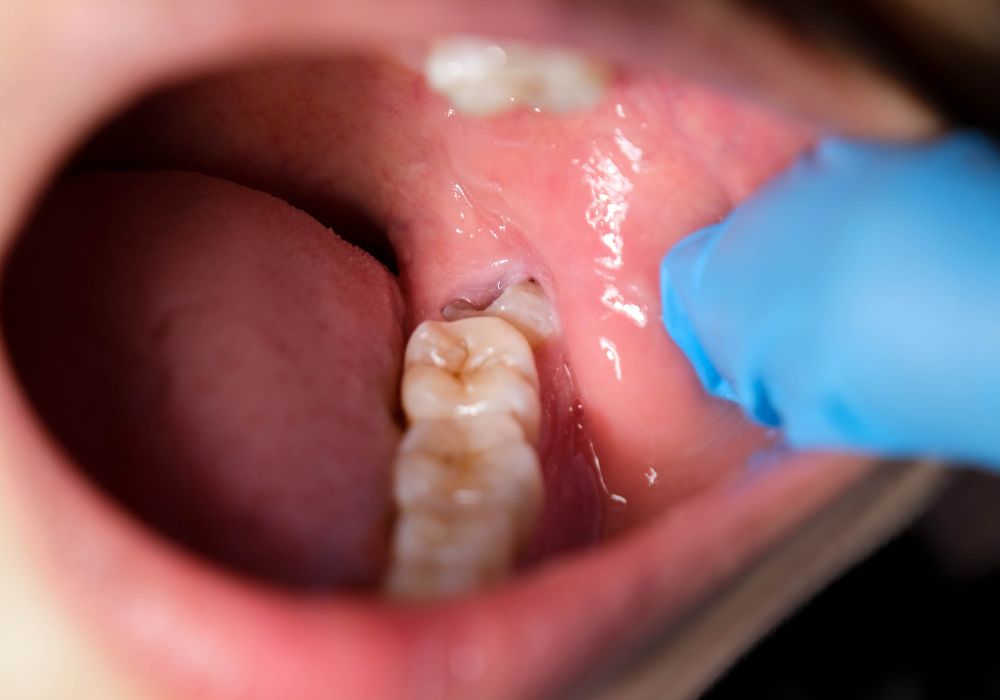Almost everyone knows how unpleasant an experience it is to have your wisdom teeth out, and when they first emerge, it can be a nervous wait to find out whether extraction will be required.
But how long will you need to wait before you know if you need to have yours pulled? To give you all the info you need, in this post, we answer the question, how long do wisdom teeth take to come through the gum?
If you want an overview of wisdom teeth, you can also check out this video before reading it.
What are wisdom teeth?

Before we talk about how long wisdom teeth take to come through, let’s take a step back and think about a more basic question – what are wisdom teeth?
Wisdom teeth are the last of our permanent teeth to come through, and most people have four of them, two on either side top and bottom.
Wisdom teeth have no milk teeth equivalent, and they usually appear once we have reached adulthood and all of our other teeth are fully developed.
However, what gives wisdom teeth their notorious reputation is the fact that by the time they come through, since all the other teeth are already there, often, there is no room for them to grow properly.
This can then lead to complications – like crowding, impacted teeth, or the teeth growing at awkward angles relative to those already present – something we’ll come back to later in this post.
When do wisdom teeth usually erupt?

Wisdom teeth are so-called since they usually come in when we are around 20, supposedly when we start to gain the wisdom of age.
However, in reality, they can appear early, sometimes erupting at 17 – and they can also come in much later, occasionally appearing at 25.
At the same time, for some people, they never erupt – and sometimes, only two or three appear rather than the usual four.
How Long Do Wisdom Teeth Take to Come Through the Gum?

So once wisdom teeth start to erupt, how long does it take for them to fully come through the gum?
This question is a little difficult to answer since the amount of time it takes for wisdom teeth to come through can vary from person to person – and this is complicated further by the possibility of impaction or other issues.
However, in most cases, once you notice your wisdom teeth coming through, it should take between a couple of weeks and a couple of months for them to be fully developed.
Also, bear in mind that they probably won’t all come through at the same time, so although each tooth might take between a couple of weeks and a couple of months to come through, it might take longer for all four to finish growing.
What are the signs that wisdom teeth are about to erupt?

Since having your wisdom teeth removed is a universally unpleasant experience, knowing that your wisdom teeth are on the way can be a nervous time, so you’ll want to know the signs that they are about to erupt.
The first indication may be a dull pain or feeling of tenderness at the back of your mouth and jaw.
Along with this, you may also notice some swelling and redness around the gums at the back of your mouth.
Some people may experience crowding in their mouth – this is a kind of dull pain that’s caused by your wisdom teeth pushing against your other teeth due to a lack of space.
In some cases, your wisdom teeth may even push some of your other teeth out of place.
When wisdom teeth start to erupt, some people also experience bad breath, which is due to increased bacteria in the mouth. This can also cause an unpleasant taste in the mouth.
Finally, another sign is that you may see white specks on the gum line.
If you want to know more about the signs that wisdom teeth are ready to erupt, you can check out this video.
What happens when wisdom teeth cause trouble?

As we mentioned above, the eruption of wisdom teeth can cause several complications, and as a result, your dentist may recommend that you have them removed.
Indeed, this is an extremely common procedure, and between five and ten million Americans undergo the procedure each year – indeed, it is estimated that as many as 85% of people need to have their wisdom teeth pulled.
There are various reasons for this.
-
Crowding
Often, wisdom teeth cause crowding because there isn’t enough space in the mouth for them to grow. This can then push existing teeth out of place, creating a crooked smile.
-
Infection
If wisdom teeth don’t fully erupt due to them being blocked by other teeth, part of the tooth can be covered by a flap of gum.
This creates an ideal breeding place for bacteria, and this in turn can lead to higher instances of infection.
If you suffer from an infection, your dentist may simply treat the infection – or they may recommend you have your wisdom teeth removed due to the high likelihood that you will suffer repeated infections in the future.
-
Impacted teeth
If teeth are impacted and can’t fully emerge, it can make it harder to clean them, increasing the chance of infection.
Impacted teeth can also cause pain as they grow, and for these reasons, if your wisdom teeth are impacted, a dentist may advise you to have them removed.
FAQs
1. Do all wisdom teeth need to be removed?
No, not all wisdom teeth need to be removed. Some people are fortunate enough to have wisdom teeth that grow correctly, so they don’t become impacted or cause any crowding.
In this case, there’s no need to have them removed, and people who find themselves in this situation can consider themselves fortunate because they are in the minority – in the US, only 15% of people don’t need to have any wisdom teeth removed.
2. Do you need to see a dentist when your wisdom teeth begin to appear?
Not necessarily. If your wisdom teeth begin to erupt and you aren’t experiencing any pain or discomfort, you don’t need to book an appointment with your dentist specifically for your wisdom teeth.
However, if your wisdom teeth cause you pain as they grow, it could mean they are causing crowding or are impacted, in which case you should book an appointment with your dentist to decide if any action needs to be taken.
3. Do you have to have your wisdom teeth removed?
Not everyone has to have their wisdom teeth removed, and even if your dentist recommends you have them removed, nobody can force you to undergo the procedure.
However, if your dentist tells you that they are likely to cause frequent infections or that they are likely to push your other teeth out of place, the best option is usually to get it over and done with and undergo the procedure.
This way, you will suffer once – but you won’t suffer repeatedly over the years due to your impacted or crooked wisdom teeth.
4. Do you need to worry if your wisdom teeth haven’t come through?
If your wisdom teeth haven’t come through, it’s nothing to worry about. Either they will come through when they are ready, or they won’t come through at all.
In any case, there’s nothing you can do to speed up the process, so all you can do is be patient and deal with any problems if and when they arise.
5. Does it hurt when wisdom teeth erupt?
The experience of wisdom teeth erupting is different for everyone.
For some people, wisdom teeth erupting and growing through the gum can be a painful experience that lasts for some weeks or longer. However, for others, the experience can be painless – and some people might not even realize they are coming through at all.
If wisdom teeth are impacted, it can cause a dull pain as they push against the other teeth, but if there is enough space for them to grow into, the pain can be minimal or even non-existent.
6. Why do we have wisdom teeth?
You might wonder why we even have wisdom teeth at all since they cause so much trouble and don’t seem to serve much of a purpose.
The answer is that they are likely to be vestigial remnants that our distant ancestors needed but that became obsolete as we evolved.
It is thought that ancient human ancestors consumed a much more plant-based diet that required more chewing, and back then, an extra set of molars at the back of the mouth were useful.
However, as our diet changed, our jaw evolved to become smaller, leaving no space for wisdom teeth to grow.
That said, it is thought that wisdom teeth still help with bite balance and the correct development of the jaw, so they’re not completely useless after all.
Eruption times vary from person to person
As we’ve seen, the timing of the eruption of wisdom teeth can vary from person to person, and so can the amount of time it takes for them to come through the gum – but once they start to emerge, it usually takes between a few weeks and a couple of months for them to grow fully.
When they start to emerge, you should monitor your wisdom teeth carefully to see how they are growing – and if they are causing you pain or growing out crooked, you should see your dentist for advice about what actions might be required to correct any problems.







